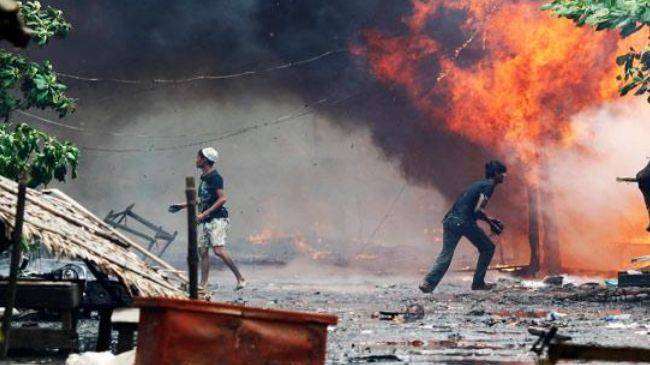YANGON: Nearly 100 police guarded a northern Myanmar village on Saturday after a Buddhist mob burned down a mosque, a police officer said, in the second attack of its kind in just over a week as anti-Muslim sentiment swells in the south-east Asian nation.
Buddhist-majority Myanmar has struggled to contain bouts of deadly religious bloodshed in recent years, with bristling sectarian tensions posing a core challenge to the new government led by Aung San Suu Kyi.
The latest flare-up in violence saw throngs of Buddhist villagers in Hpakant, a jade-mining town in northern Kachin state, storm a mosque and set it ablaze on Friday.
“The problem started because the mosque was built near a [Buddhist] pagoda.
The Muslim people refused to destroy the building when the Buddhists discovered it,” said Moe Lwin, a local police officer.
He said around 90 police officers are now stationed in the village, where the situation has calmed.
No arrests have been made, he added.
The riot came eight days after a crowd of Buddhists destroyed another mosque in central Bago, forcing the Muslim community to seek refuge in a neighbouring town.
Tensions are also simmering in western Rakhine, a state scarred by deadly riots in 2012 that left communities almost completely divided along religious lines.
The region is home to the stateless Rohingya, a Muslim minority largely relegated to destitute displacement camps and subject to host of restrictions on their movements and access to basic services.
Suu Kyi, a veteran democracy activist who championed her country’s struggle against repressive military rulers, has drawn criticism from rights groups for not taking swifter moves to carve out a solution for the ethnic minority.
Her government recently ordered officials to refer to the group as “people who believe in Islam in Rakhine State” instead of Rohingya — a term whose use has set off protests by hard-line Buddhists who insist the group are illegal immigrants from Bangladesh.
Yet even the government’s broad phrase has failed to placate local Rakhine Buddhists, who demand the group be referred to only as “Bengalis” and say they are preparing to rally in protest at the order on Sunday.
After a 12-day visit to troubled Rakhine and other conflict sites in Myanmar, a UN rights investigator warned on Friday that “tensions along religious lines remain pervasive across Myanmar society”.
Yanghee Lee urged the country’s new civilian government to make “ending institutionalised discrimination against the Muslim communities in Rakhine State ... an urgent priority”.






